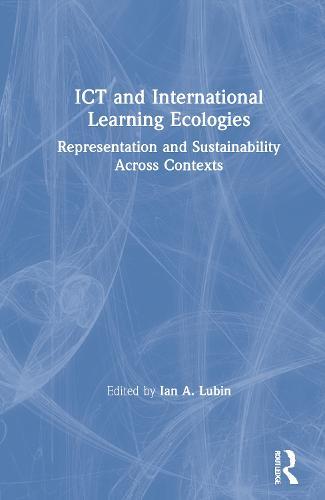Full Product Details
Author: Ian A. Lubin
Publisher: Taylor & Francis Ltd
Imprint: Routledge
Weight: 0.439kg
ISBN: 9780367358556
ISBN 10: 0367358557
Pages: 214
Publication Date: 22 June 2021
Audience:
College/higher education
,
Tertiary & Higher Education
Format: Hardback
Publisher's Status: Active
Availability: In Print

This item will be ordered in for you from one of our suppliers. Upon receipt, we will promptly dispatch it out to you. For in store availability, please contact us.
Reviews
""Can education move beyond the heritage of neo-colonialism and neoliberalism? ICT and International Learning Ecologies offers a radical vision of educational technology for a pluralistic world that cherishes human diversity."" —Andrew Feenberg, Professor in the School of Communication at Simon Fraser University, Canada ""ICT and International Learning Ecologies is like no other book that I have encountered. It shows how cutting-edge technologies can be harnessed in support of education that challenges Western hegemony and respects diversity around the world. It provides a novel vision of how education can, in turn, support cultural and environmental sustainability, building upon and learning from traditional, local, and indigenous ways of being. This is a timely contribution as the world struggles with climate change, environmental degradation, and growing inequality."" —Juha I. Uitto, Director of the Independent Evaluation Office at the Global Environment Facility, USA ""Settler colonialism and its logic of elimination continue to impact Indigenous people and disrupt our ways of knowing, being, and doing in the world. But we are still here. Indigenous peoples remain sceptical about our cultural knowledges and how new technologies have the ability to further marginalise our lives and our collectivities. Certainly, we have little evidence to support that any form of Western intervention will be beneficial to us. ICT and International Learning Ecologies brings forward the debates around Western knowledge and ICT and Indigenous participation. This is an important contribution to the discussions on technology and learning ecologies and how we ensure a more just world where Indigenous peoples are not further exploited and marginalised."" —Bronwyn Carlson, Professor and Head of the Department of Indigenous Studies at Macquarie University, Australia
Can education move beyond the heritage of neo-colonialism and neoliberalism? ICT and International Learning Ecologies offers a radical vision of educational technology for a pluralistic world that cherishes human diversity. -Andrew Feenberg, Professor in the School of Communication at Simon Fraser University, Canada.
Can education move beyond the heritage of neo-colonialism and neoliberalism? ICT and International Learning Ecologies offers a radical vision of educational technology for a pluralistic world that cherishes human diversity. -Andrew Feenberg, Professor in the School of Communication at Simon Fraser University, Canada ICT and International Learning Ecologies is like no other book that I have encountered. It shows how cutting-edge technologies can be harnessed in support of education that challenges Western hegemony and respects diversity around the world. It provides a novel vision of how education can, in turn, support cultural and environmental sustainability, building upon and learning from traditional, local, and indigenous ways of being. This is a timely contribution as the world struggles with climate change, environmental degradation, and growing inequality. -Juha I. Uitto, Director of the Independent Evaluation Office at the Global Environment Facility, USA
Can education move beyond the heritage of neo-colonialism and neoliberalism? ICT and International Learning Ecologies offers a radical vision of educational technology for a pluralistic world that cherishes human diversity. -Andrew Feenberg, Professor in the School of Communication at Simon Fraser University, Canada ICT and International Learning Ecologies is like no other book that I have encountered. It shows how cutting-edge technologies can be harnessed in support of education that challenges Western hegemony and respects diversity around the world. It provides a novel vision of how education can, in turn, support cultural and environmental sustainability, building upon and learning from traditional, local, and indigenous ways of being. This is a timely contribution as the world struggles with climate change, environmental degradation, and growing inequality. -Juha I. Uitto, Director of the Independent Evaluation Office at the Global Environment Facility, USA Settler colonialism and its logic of elimination continue to impact Indigenous people and disrupt our ways of knowing, being, and doing in the world. But we are still here. Indigenous peoples remain sceptical about our cultural knowledges and how new technologies have the ability to further marginalise our lives and our collectivities. Certainly, we have little evidence to support that any form of Western intervention will be beneficial to us. ICT and International Learning Ecologies brings forward the debates around Western knowledge and ICT and Indigenous participation. This is an important contribution to the discussions on technology and learning ecologies and how we ensure a more just world where Indigenous peoples are not further exploited and marginalised. -Bronwyn Carlson, Professor and Head of the Department of Indigenous Studies at Macquarie University, Australia
Author Information
Ian A. Lubin is an international learning design and technology consultant with experience in national and global educational issues. He is editor of the book ICT-Supported Innovations in Small Countries and Developing Regions: Perspectives and Recommendations for International Education, which received the Best Book Award from the Association for Educational Communications and Technology (AECT)'s Culture, Learning, and Technology Division.



